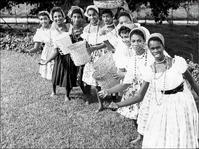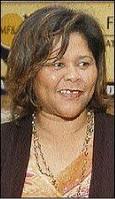
Ian Boyne
Forty-six years of independence have left people with a "so what?" or a "we're worse off" sentiment. The Government is trying its best to stimulate excitement in emancipation and independence celebrations, but Jamaicans will catch as much of the entertainment fire as possible without warming to the significance of what should be two pivotal historical landmarks.
For the vast majority of Jamaicans, emancipation and independence days are glorious opportunities to be away from work and to cool out and have some fun. All the messages about the meaning of emancipation and independence are seen as just obligatory rituals of the season.
The fact is that we manifest little genuine emancipation or independence. Oh, politically we have them down pat. Culturally, significant progress has been made - using culture in the limited sense of the arts. Our achievements in music, dance, fashion, drama, etc, have been truly noteworthy. In industry we have also made some notable achievements. But as to emancipating ourselves from mental slavery, we have betrayed the revolution.
US consumerist culture

Members of the Mandeville Creative Dance Group, circa 1962 - one of the performing groups that have helped to instill a sense of national pride within Jamaicans. - File
We are today merely mimic men and women for American consumerist and materialistic culture. We have replaced British colonialist mentality with American cultural imperialism.
Talk to our young people. Their values are the same as those of various strata of American youths. They know more about American culture than their own - and they are proud of that. They would probably regard as backward, elements of our culture which the Jamaica Cultural Development Commission is pushing.
Of course, there are things distinctively Jamaican which are valued - like dancehall. But that is just the packaging. The substance is American consumerist and hedonistic cultural mores. Our youths are captives of the MTV and BET culture.
Excellent research work
Former Television Jamaica boss Marcia Forbes has done some excellent research work for her University of the West Indies PhD thesis. The research looks at 'Music Videos and the Sexual Culture of Jamaican Adolescents'. Forbes lists as her motivation for the research the concerns about the content of music videos. Some of these she lists as: "Risky sexual behaviours - multiple partners; sexualisation of females and males; commodification of sex and glorification of materialism and consumerism". This is no peripheral research. It has profound implications for national development and the future of Jamaica.
One of the problems we have in Jamaica is our compulsive myopia and our intense difficulty in seeing the inter-connectedness of issues. We don't make the connection between our sexual irresponsibility, with its resultant phenomenon of fatherlessness, and our high crime rate. Marcia Forbes has done us a service by her research.
She has found in her robust empirical research that an astounding 98.2 per cent of adolescents watch music videos, with 56.5 per cent having no restrictions on the numbers they watch.
Culture of sex
Dancehall and hip hop, expectedly, dominate the viewing patterns. Forbes finds that "heavy viewing of videos (over one hour per day) influences Jamaican adolescents into a culture of sex!"(Emphasis hers.) She continues: "Adolescent boys in general, but especially 10 - 12-year-olds are at highest risk for engaging in sexual activities."
With regard to dancehall and hip hop, Forbes says, "The more sexually oriented music videos girls watched, the greater their likelihood to have had sex; to have done so with more than one person and to have engaged in a wider variety of sexual activities." In one of her sections, "Boys at risk!" she informs: "The more music videos in general that boys watched, the more likely they were to hold permissive sexual attitudes and engage in sexual types of behaviours, especially risky sex such as many different partners and not always using a condom during sexual intercourse."
The slave masters deliberately and strategically wrecked our families and reared our men as studs. Today, we willingly and with alacrity do the same to ourselves.
The Jews and the Chinese are known for their close family bonds. And also for their wealth, industry and achievements, wherever they have gone. The two sets of facts are not disconnected.
Jamaicans, if we really were to take both emancipation and independence seriously, should have a lot of sober thinking to do over this weekend and into the week. But we are too busy blinging, daggering, cooling out, hanging out, and attending various 'dos' glorified on Page Two of the competition and the social pages of this paper, to have any time for serious thinking. We are slaves to our passions and to what the ancient philosophers called our lower nature.
One of the most telling indicators of our betrayal of the emancipation and independence dream is the way we use power. The abuse of power is rampant and it is not limited to the state. The abuse of power takes place at all levels - and among all classes. It is not confined to those at the top.
Abuse of power
The penchant to abuse power is a primary reason why the police force is not trusted and why we cannot get public support for some hard measures necessary at this time. Though the public has a deep desire to see the Government deal firmly and decisively with criminals, one poll found that the majority of Jamaicans were opposed to giving the police any more powers to detain people for longer periods. If we had a police force which was not a relic of the plantation, in terms of its behaviour toward the masses, we could introduce certain measures with greater public support.
Ordinary people will tell you that when you give any little man a little power he starts to push people around and abuse it. The more power he has it's the more abuse he unleashes. Many workers will tell you that their bosses are anything but compassionate, empathetic persons concerned about their welfare. Many refer to the bosses as slave drivers and it is not just because they are lazy good-for-nothing workers.
If bosses were better at motivating workers and in building synergies - which is the real task of management - workers' attitudes would be different. Any comprehensive survey done among the Jamaican workforce would yield deeply disturbing results. But we don't make the connection between our low productivity and creativity at then workplace and these toxic relationships, which have their genesis in power relations at the plantation. Our emancipation is yet to come.
The things bosses get away with in Jamaica they could never get away with in North America and Europe. We have some big, powerful men in this country, lionised in the media, who in luncheon and after-dinner speeches lecture politicians about morality, but who are sexual predators who exploit their position to bed female employees.
There are prominent men in this country, holding exalted positions in private and public sector entities, who routinely use sexual politics to advance their lovers and who promote their sex slaves over other more competent women. And we take this for granted in our culture. A nuh nutten. There is no alarm over this. The human rights groups are not issuing statements about this flagrant abuse of human rights. Some of the things our corporate and public sector executives get away with in Jamaica they could never get away with it in America or Canada. The media would hound them out of office.
Sexual favours

Marcia Forbes has done the nation a service by her research into popular entertainment and youths' attitudes to sex.
Sexual harassment and the inducement of sexual favours are no big things to us. A World Bank president, a highly competent man with strong connections with President Bush, had to leave his job simply because he promoted his girlfriend, whose competence nobody was questioning. In Jamaica, that executive would get his regular bonuses and be praised for how well he built his company and made it profitable. No wonder sexual harassment legislation has taken so long to come on the books here.
Our women are still not emancipated from these lecherous wolves who happen to occupy powerful corporate positions. And there is no human rights organisation to take up their cause loudly.
In our culture, people are judged not by how much they produce but by how much they consume. People don't add value by creating or producing. They are seen as valuable by what they drive, where they live, what they wear, what jobs they hold and how much money they have. In Jamaica, it is not the person who works hard who gets the most honour and 'ratings'. We reserve the biggest photographs in our newspapers to those at play, not those hard at work. Small, but significant gestures.
We don't have a production culture. No wonder so many of our people got sucked into get-rich-quick schemes like Cash Plus and Olint. Jamaica is tailor-made for these kinds of fantasy schemes. We don't have a culture which glorifies work, effort and excellence. We have an Anancy culture, a culture where everyone wants to beat the system and use tricks and shortcuts to get ahead. In our Brother Anancy culture, those who play by the rules get shafted.
Our culture is characterised by divisiveness, facetiousness, tribalism. Jamaicans are not distinguished by our cooperation. We find every reason to divide ourselves. The same divide-and-rule tactics of the plantation are with us. The us-them attitude. Only sports unite us - and that is only when we're winning, and when everyone jumps on the bandwagon.
We will have our moments of coming together this month, of course, because it's Olympics time. After that (not meaning the month, but the moment), we go back to fighting and tearing one another apart.
We can't write ourselves off. But nor should we be complacent at 46 and after 170 years of emancipation. What is it that really defines us as a people? What is the national vision shared by all of us? What essentially is a Jamaican? If we could only find some time to think about these questions.
But we won't. There are so many events, 'happenings'. I don't want to be left out. I shall be there at Mas Camp on Tuesday to see my musical idol, 'Mr Rocksteady', Alton 'The Great' Ellis, along with other stars. I too need a break from reality.
Ian Boyne is a veteran journalist who may be reached at ianboyne1@yahoo.com. Feedback may also be sent to columns@gleanerjm.com.

